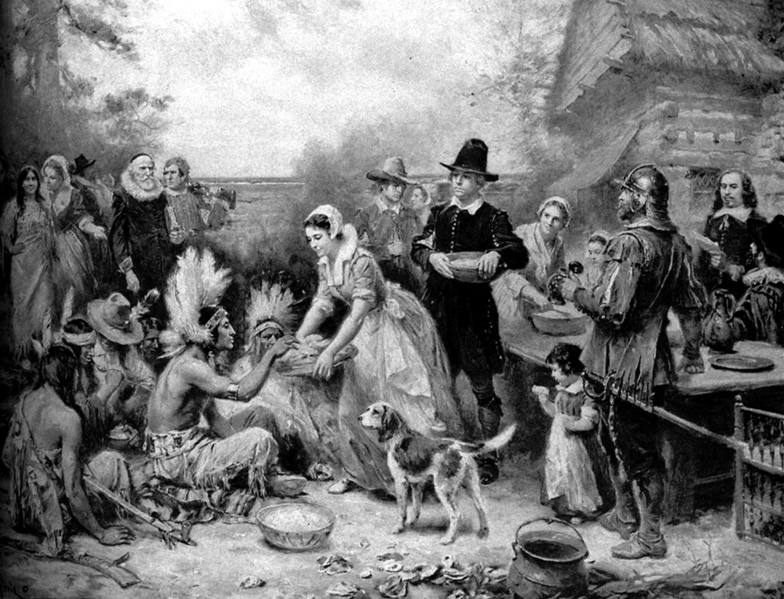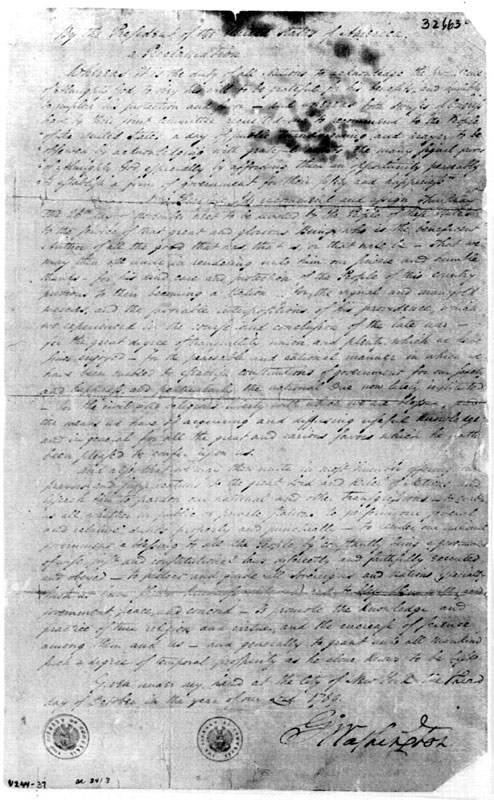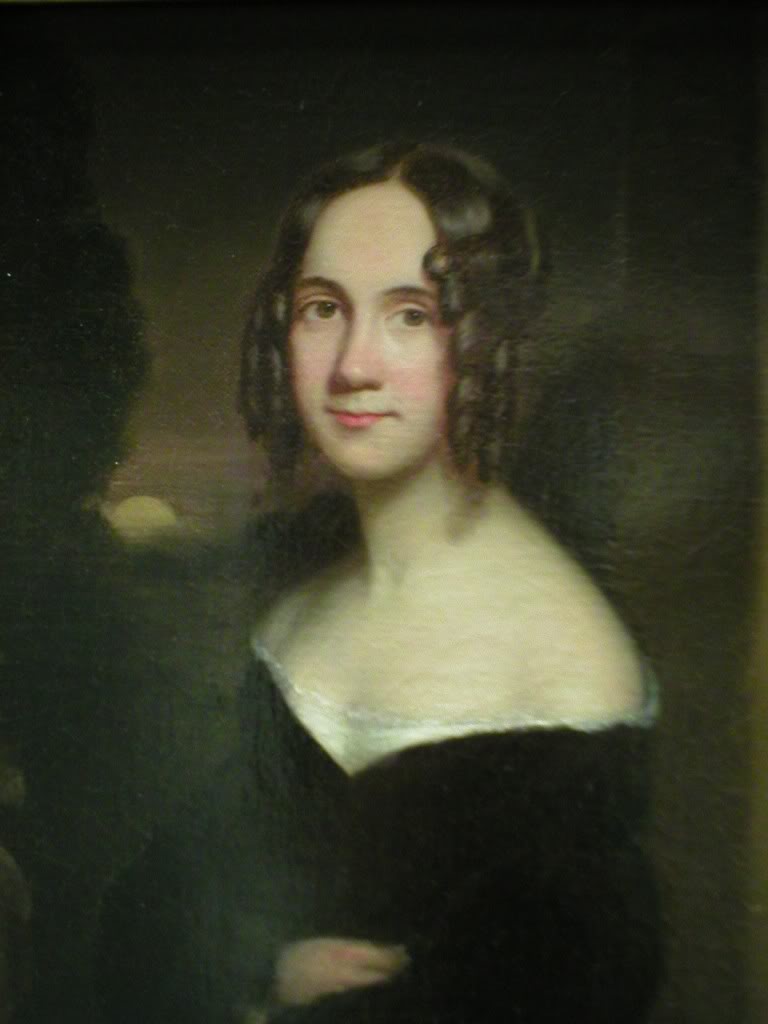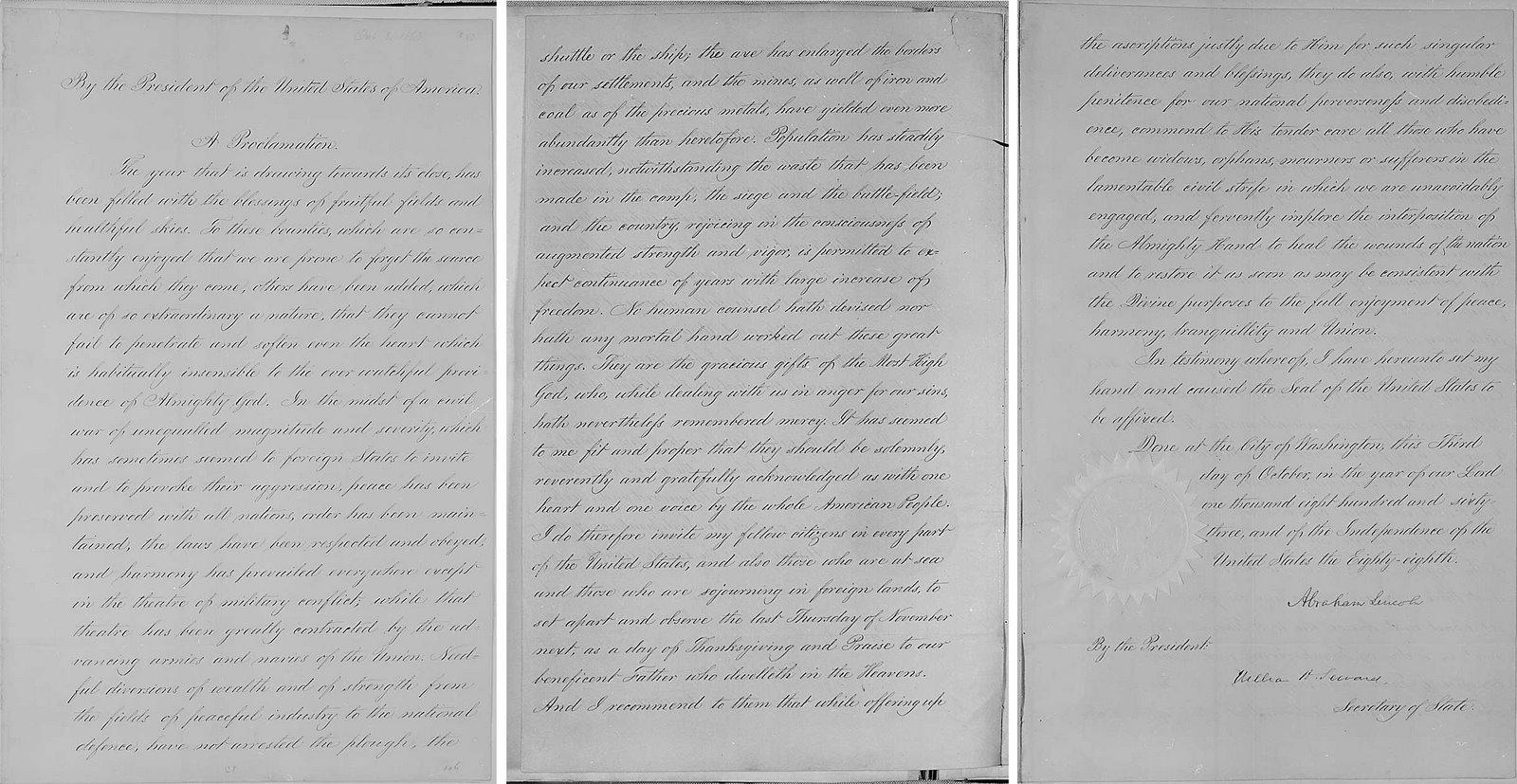Understanding Thanksgiving
The Origins of a Tradition, from 1621 to 1863
'Frostiana,' Randall Thompson's setting of Robert Frost's 'Stopping By the Woods on a Snowy Evening'The celebration we now popularly regard as the "First Thanksgiving" was the Pilgrims' three-day feast celebrated in early November of 1621 (although a day of thanks in America was observed in Virginia at Cape Henry in 1607). The first Thanksgiving to God in the Calvinist tradition in Plymouth Colony was actually celebrated during the summer of 1623, when the colonists declared a Thanksgiving holiday after their crops were saved by much-needed rainfall.
The Pilgrims left Plymouth, England, on September 6, 1620, sailing for a new world that offered the promise of both civil and religious liberty. They had earlier left England in 1608, as the Church of England had curtailed their freedom to worship according to their individual consciences.
The Pilgrims had settled in Holland for twelve years, where they found spiritual liberty in the midst of a disjointed economy (which failed to provide adequate compensation for their labors) and a dissolute, degraded, corrupt culture (which tempted their children to stray from faith). For almost three months, 102 seafarers braved harsh elements to arrive off the coast of what is now Massachusetts, in late November of 1620. On December 11, prior to disembarking at Plymouth Rock, they signed the "Mayflower Compact," America's original document of civil government and the first to introduce self-government. While still anchored at Provincetown harbor, their Pastor John Robinson counseled, "You are become a body politic ... and are to have only them for your... governors which yourselves shall make choice of."
The Pilgrims were Separatists, America's Calvinist Protestants, who rejected the institutional Church of England. They believed that the worship of God must originate in the inner man, and that corporate forms of worship prescribed by man interfered with the establishment of a true relationship with God. The Separatists used the term "church" to refer to the people, the Body of Christ, not to a building or institution. As their Pastor John Robinson said, "[When two or three are] gathered in the name of Christ by a covenant made to walk in all the way of God known unto them as a church."
Upon landing in America, the Pilgrims conducted a prayer service, then quickly turned to building shelters. Starvation and sickness during the ensuing New England winter killed almost half their population, but through prayer and hard work, with the assistance of their Indian friends, the Pilgrims reaped a rich harvest in the summer of 1621. Most of what we know about the Pilgrim Thanksgiving of 1621 comes from original accounts of the young colony's leaders, Governor William Bradford and Master Edward Winslow, in their own hand.
"They begane now to gather in ye small harvest they had, and to fitte up their houses and dwellings against winter, being well recovered in health & strenght, and had all things in good plenty; for some were thus imployed in affairs abroad, others were excersised in fishing, aboute codd, & bass, & other fish, of which yey tooke good store, of which every family had their portion. All ye somer ther was no wante. And now begane to come in store of foule, as winter aproached, of which this place did abound when they came first (but afterward decreased by degree). And besids water foule, ther was great store of wild Turkies, of which they took many, besids venison, &c. Besids they had aboute a peck a meale a weeke to a person, or now since harvest, Indean corne to yt proportion. Which made many afterwards write so largly of their plenty hear to their freinds in England, which were not fained, but true reports." —W.B. (William Bradford)
"Our Corne did proue well, & God be praysed, we had a good increase of Indian Corne, and our Barly indifferent good, but our Pease not worth the gathering, for we feared they were too late sowne, they came vp very well, and blossomed, but the Sunne parched them in the blossome; our harvest being gotten in, our Governour sent foure men on fowling, that so we might after a more speciall manner reioyce together, after we had gathered the fruit of our labors; they foure in one day killed as much fowle, as with a little helpe beside, served the Company almost a weeke, at which time amongst other Recreations, we exercised our Armes, many of the Indians coming amongst vs, and among the rest their greatest King Massasoyt, with some nintie men, whom for three dayes we entertained and feasted, and they went out and killed fiue Deere, which they brought to the Plantation and bestowed upon our Governour, and upon the Captaine, and others. And although it be not alwayes so plentifull, as it was at this time with vs, yet by the goodneses of God, we are so farre from want, that we often wish you partakers of our plenty." —E.W. (Edward Winslow) Plymouth, in New England, this 11th of December, 1621.
The feast included foods suitable for a head table of honored guests, such as the chief men of the colony and Native leaders Massasoit ("Great Leader" also known as Ousamequin "Yellow Feather"), the sachem (chief) of Pokanoket (Pokanoket is the area at the head of Narragansett Bay). Venison, wild fowl, turkeys and Indian corn were the staples of the meal, which likely also included other food items known to have been aboard the Mayflower or available in Plymouth, such as spices, Dutch cheese, wild grapes, lobster, cod, native melons, pumpkin (pompion) and rabbit.
By the mid-17th century, the custom of autumnal Thanksgivings was established throughout New England. Observance of Thanksgiving Festivals began to spread southward during the American Revolution, as the newly established Congress officially recognized the need to celebrate this holy day.
O Praise the Lord of Heaven! Written by William Billings (1746-1800), sung by His Majesty's Clerkes under the direction of Paul Hillier.The first Thanksgiving Proclamation was issued by the revolutionary Continental Congress on November 1, 1777. Authored by Samuel Adams, it was one sentence of 360 words, which read in part: "Forasmuch as it is the indispensable duty of all men to adore the superintending providence of Almighty God; to acknowledge with gratitude their obligation to him for benefits received...together with penitent confession of their sins, whereby they had forfeited every favor; and their humble and earnest supplications that it may please God through the merits of Jesus Christ, mercifully to forgive and blot them out of remembrance...it is therefore recommended...to set apart Thursday the eighteenth day of December next, for solemn thanksgiving and praise, that with one heart and one voice the good people may express the grateful feeling of their hearts and consecrate themselves to the service of their Divine Benefactor...acknowledging with gratitude their obligations to Him for benefits received....To prosper the means of religion, for the promotion and enlargement of that kingdom which consisteth 'in righteousness, peace and joy in the Holy Ghost'."
180 years after the first day of thanksgiving in America, our Founding Fathers officially recognized the day by proclamation of the Constitutional government. Soon after adopting the Bill of Rights, a motion in Congress to initiate the proclamation of a national day of thanksgiving was approved.
(source: http://www.apuritansmind.com/christianwalk/FirstThanksgiving.htm)
Epithalamica, Peter Abelard (1079-1142), a medieval bridal song now associated with Thanksgiving. Paul Hillier, baritone; Paul Elliott, Alan Bennett, tenors; Moira Smiley, mezzo sopranoA National Thanksgiving
George Washington's 1789 Thanksgiving Proclamation1. Setting the Stage
On 25 September 1789, Elias Boudinot of Burlington, New Jersey, introduced in the United States House of Representatives a resolution "That a joint committee of both Houses be directed to wait upon the President of the United States, to request that he would recommend to the people of the United States a day of public thanksgiving and prayer to be observed by acknowledging, with grateful hearts, the many signal favors of Almighty God, especially by affording them an opportunity peaceably to establish a Constitution of government for their safety and happiness." The House was not unanimous in its determination to give thanks. Aedanus Burke of South Carolina objected that he "did not like this mimicking of European customs, where they made a mere mockery of thanksgivings." Thomas Tudor Tucker "thought the House had no business to interfere in a matter which did not concern them. Why should the President direct the people to do what, perhaps, they have no mind to do? They may not be inclined to return thanks for a Constitution until they have experienced that it promotes their safety and happiness. We do not yet know but they may have reason to be dissatisfied with the effects it has already produced; but whether this be so or not, it is a business with which Congress have nothing to do; it is a religious matter, and, as such, is proscribed to us. If a day of thanksgiving must take place, let it be done by the authority of the several States." [1]
Citing biblical precedents and resolutions of the Continental Congress, the proponents of a Thanksgiving celebration prevailed, and the House appointed a committee consisting of Elias Boudinot, Roger Sherman, and Peter Silvester to approach President Washington. The Senate agreed to the resolution on 26 September and appointed William Samuel Johnson and Ralph Izard to the joint committee. On 28 September the Senate committee reported that they had laid the resolution before the president. [2] Washington issued the proclamation on 3 October, designating a day of prayer and thanksgiving.
Whatever reservations may have been held by some public officials, the day was widely celebrated throughout the nation. The Virginia assembly, for example, resolved on 19 November that the chaplain "to this House, be accordingly requested to perform divine service, and to preach a sermon in the Capitol, before the General Assembly, suitable to the importance and solemnity of the occasion, on the said 26th day of November." [3] Most newspapers printed the proclamation and announced plans for public functions in honor of the day. Many churches celebrated the occasions by soliciting donations for the poor. Washington's secretary, Tobias Lear, wrote to John Rodgers, pastor of the two Presbyterian churches in New York City, on 28 November, that "by direction of the President of the United States I have the pleasure to send you twenty five dollars to be applied towards relieving the poor of the Presbyterian Churches. A paragraph in the papers mentioned that a contribution would be made for that purpose on Thanksgiving day; as no opportunity offered of doing it at that time, and not knowing into whose hands the money should be lodged which might be given afterwards—The President of the United States has directed me to send it to you, requesting that you will be so good as to put it into the way of answering the charitable purpose for which it is intended." [4]
Washington enclosed the Thanksgiving Proclamation in his Circular to the Governors of the States, written at New York on 3 October 1789: "I do myself the honor to enclose to your Excellency a Proclamation for a general Thanksgiving which I must request the favor of you to have published and made known in your State in the way and manner that shall be most agreeable to yourself." [5]
The original document used here online is the Library of Congress copy (DS, DLC:GW) of the Thanksgiving Proclamation.
Notes
The above is adapted from the annotation to Washington's Circular to the Governors of the States, 3 October 1789, printed in volume 4 of The Papers of George Washington, Presidential Series, W. W. Abbot, Dorothy Twohig, et al (University Press of Virginia, Charlottesville and London, 1993; Dorothy Twohig, volume editor), pp. 129-30.1. Joseph Gales, Sr., compiler. The Debates and Proceedings in the Congress of the United States; with an Appendix, Containing Important State Papers and Public Documents, and All the Laws of a Public Nature. (Annals of Congress.) 42 vols. Washington, D.C., 1834-1856, pp. 1:949-50.
2. Linda G. De Pauw et al., eds. Documentary History of the First Federal Congress of the United States of America. Eight volumes to date. Baltimore, 1972—, pp. 1:192, 197; 3:232, 238.
3. Journal of the House of Delegates of the Commonwealth of Virginia; Begun and Holden in the City of Richmond . . . on Monday, the Nineteenth Day of October, in the Year of Our Lord One Thousand Seven Hundred and Eighty-nine. Richmond, 1828, p. 70.
4. National Archives, Record Group 59, Miscellaneous Letters. Washington, D.C.
5. W. W. Abbot, Dorothy Twohig, et al, eds. The Papers of George Washington, Presidential Series. Charlottesville, 1987—, pp. 4:129-32.
***
2. Washington’s Proclamation
(First official Presidential proclamation
issued in the United States)Whereas it is the duty of all nations to acknowledge the providence of Almighty God, to obey His will, to be grateful for His benefits, and humbly to implore His protection and favor; and Whereas both Houses of Congress have, by their joint committee, requested me to "recommend to the people of the United States a day of public thanksgiving and prayer, to be observed by acknowledging with grateful hearts the many and signal favors of Almighty God, especially by affording them an opportunity peaceably to establish a form of government for their safety and happiness:"
Now, therefore, I do recommend and assign Thursday, the 26th day of November next, to be devoted by the people of these States to the service of that great and glorious Being who is the beneficent author of all the good that was, that is, or that will be; that we may then all unite in rendering unto Him our sincere and humble thanks for His kind care and protection of the people of this country previous to their becoming a nation; for the signal and manifold mercies and the favorable interpositions of His providence in the course and conclusion of the late war; for the great degree of tranquility, union, and plenty which we have since enjoyed; for the peaceable and rational manner in which we have been enable to establish constitutions of government for our safety and happiness, and particularly the national one now lately instituted for the civil and religious liberty with which we are blessed, and the means we have of acquiring and diffusing useful knowledge; and, in general, for all the great and various favors which He has been pleased to confer upon us.
And also that we may then unite in most humbly offering our prayers and supplications to the great Lord and Ruler of Nations and beseech Him to pardon our national and other transgressions; to enable us all, whether in public or private stations, to perform our several and relative duties properly and punctually; to render our National Government a blessing to all the people by constantly being a Government of wise, just, and constitutional laws, discreetly and faithfully executed and obeyed; to protect and guide all sovereigns and nations (especially such as have shown kindness to us), and to bless them with good governments, peace, and concord; to promote the knowledge and practice of true religion and virtue, and the increase of science among them and us; and, generally to grant unto all mankind such a degree of temporal prosperity as He alone knows to be best.
Given under my hand, at the city of New York, the 3d day of October, A.D. 1789.
G. Washington
***
Aaron Copland, Variations On a Shaker Melody, The Texas Youth Orchestra at the Minorit Church in Vienna, Austria on July 18, 20093. The Lincoln Proclamation, The Enduring Tradition
Proclamation of Thanksgiving
Washington, D.C.
October 3, 1863
Sarah Josepha HaleThis is the proclamation that set the precedent for America's national day of Thanksgiving. During his administration, President Lincoln issued many orders like this. For example, on November 28, 1861, he ordered government departments closed for a local day of thanksgiving.
Sarah Josepha Hale, a prominent magazine editor, wrote a letter to Lincoln on 28, 1863, urging him to have the "day of our annual Thanksgiving made a National and fixed Union Festival." She wrote, "You may have observed that, for some years past, there has been an increasing interest felt in our land to have the Thanksgiving held on the same day, in all the States; it now needs National recognition and authoritive fixation, only, to become permanently, an American custom and institution." The document below sets apart the last Thursday of November "as a day of Thanksgiving and Praise."
According to an April 1, 1864, letter from John Nicolay, one of President Lincoln's secretaries, this document was written by Secretary of State William Seward, and the original was in his handwriting. On October 3, 1863, fellow Cabinet member Gideon Welles recorded in his diary that he complimented Seward on his work. A year later the manuscript was sold to benefit Union troops.
Some Lincoln scholars are of the opinion that Ms. Hale’s note urging a national day of Thanksgiving arrived a time when the President was considering such a day himself, in light of the horrors of nearly a year earlier, at the Battle of Antietam, the bloodiest day in American history with more than 23,000 casualties near Sharpsburg, Maryland. Matthew Brady’s photos of the dead, when exhibited at a New York gallery, moved the New York Times to comment on “the terrible reality and earnestness of war.”
Writes an unnamed blogger at The Strange Death of Liberal America: “While his Thanksgiving Proclamation has neither the philosophical profundity nor the rhetorical precision of what he said at Gettysburg it has something else: a faith in what he termed ‘one heart and voice by the whole American people.’ Abraham Lincoln had the ability to foresee a day when all Americans gathered with friends and family to enjoy each others’ company and give simple thanks for their blessings. In Lincoln’s words, Thanksgiving becomes the most American of holidays—even more than the Fourth of July and all the rest—a national day of unity when all the disparate strands of this diverse nation knit together not to celebrate, but to simply be thankful.”
By the President of the United States of America.
A Proclamation.The year that is drawing towards its close, has been filled with the blessings of fruitful fields and healthful skies. To these bounties, which are so constantly enjoyed that we are prone to forget the source from which they come, others have been added, which are of so extraordinary a nature, that they cannot fail to penetrate and soften even the heart which is habitually insensible to the ever watchful providence of Almighty God. In the midst of a civil war of unequaled magnitude and severity, which has sometimes seemed to foreign States to invite and to provoke their aggression, peace has been preserved with all nations, order has been maintained, the laws have been respected and obeyed, and harmony has prevailed everywhere except in the theatre of military conflict; while that theatre has been greatly contracted by the advancing armies and navies of the Union. Needful diversions of wealth and of strength from the fields of peaceful industry to the national defence, have not arrested the plough, the shuttle or the ship; the axe has enlarged the borders of our settlements, and the mines, as well of iron and coal as of the precious metals, have yielded even more abundantly than heretofore. Population has steadily increased, notwithstanding the waste that has been made in the camp, the siege and the battle-field; and the country, rejoicing in the consiousness of augmented strength and vigor, is permitted to expect continuance of years with large increase of freedom.
No human counsel hath devised nor hath any mortal hand worked out these great things. They are the gracious gifts of the Most High God, who, while dealing with us in anger for our sins, hath nevertheless remembered mercy.
It has seemed to me fit and proper that they should be solemnly, reverently and gratefully acknowledged as with one heart and one voice by the whole American People. I do therefore invite my fellow citizens in every part of the United States, and also those who are at sea and those who are sojourning in foreign lands, to set apart and observe the last Thursday of November next, as a day of Thanksgiving and Praise to our beneficent Father who dwelleth in the Heavens. And I recommend to them that while offering up the ascriptions justly due to Him for such singular deliverances and blessings, they do also, with humble penitence for our national perverseness and disobedience, commend to His tender care all those who have become widows, orphans, mourners or sufferers in the lamentable civil strife in which we are unavoidably engaged, and fervently implore the interposition of the Almighty Hand to heal the wounds of the nation and to restore it as soon as may be consistent with the Divine purposes to the full enjoyment of peace, harmony, tranquillity and Union.
In testimony whereof, I have hereunto set my hand and caused the Seal of the United States to be affixed.
Done at the City of Washington, this Third day of October, in the year of our Lord one thousand eight hundred and sixty-three, and of the Independence of the Unites States the Eighty-eighth.
By the President: Abraham Lincoln
William H. Seward, Secretary of State
Founder/Publisher/Editor: David McGee
Contributing Editors: Billy Altman, Laura Fissinger, Christopher Hill, Derk Richardson
Logo Design: John Mendelsohn (www.johnmendelsohn.com)
Website Design: Kieran McGee (www.kieranmcgee.com)
Staff Photographers: Audrey Harrod (Louisville, KY; www.flickr.com/audreyharrod), Alicia Zappier (New York)
E-mail: thebluegrassspecial@gmail.com
Mailing Address: David McGee, 201 W. 85 St.—5B, New York, NY 10024






